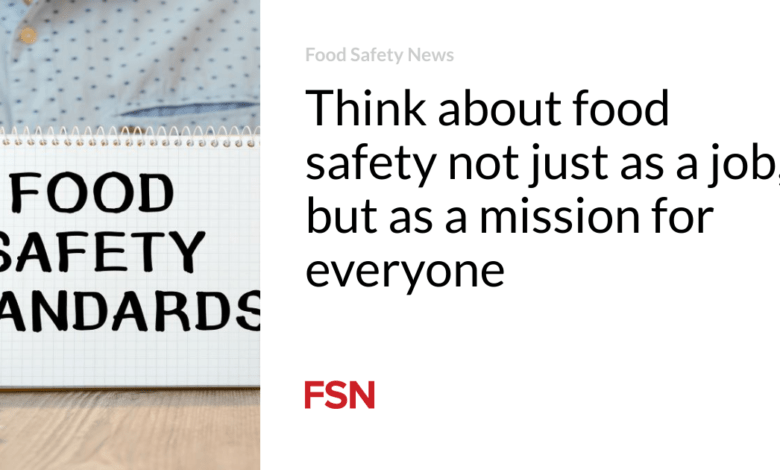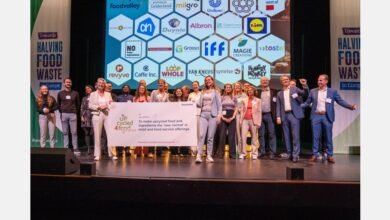Think about food safety not just as a job, but as a mission for everyone

Co-author Tyler Williams, Director of Scientific Services, PathoSans
— OPINION —
Each of the authors of this article serves a specific role for our respective organizations. But we are united by a belief in the importance of food safety as a critical public and personal health issue that impacts everyone. It’s an issue that can, without warning, make otherwise healthy people sick or even die – some of them young children. Yet, despite growing risks in the increasingly complex worldwide food industry, it’s an issue that is still too often rooted in a culture of ignorance and pass-the-buck thinking.
Food safety is a major global health problem. In the U.S. alone, we claim to have one of the safest food supplies in the world. Yet each year, according to the USDA, 48 million get sick, 128,000 are hospitalized, and 3,000 die from foodborne illnesses. One of the authors of this article personally experienced the death of a child from an E. coli outbreak. So, we know just how real the risk is. We believe that It needs to be addressed by making it more than just “someone’s job;” it needs to be everyone’s mission.
Education and public policy
Often, when a serious food safety incident occurs, it’s publicized by local and national media, and sometimes it goes viral on social media. But frequently, people become ill in a way that doesn’t attract attention. Sometimes, they aren’t even fully aware what made them ill; food-related illnesses can be mistaken as the flu or some other undiagnosed illness.
Unlike many other common consumer products, food – despite being consumed daily by every human – often does not have enough consumer and worker education. For example, a common and simple step ladder has safety warnings printed on its side. But have you ever seen a safety warning inserted into a package of ground beef about cooking it properly? Is the public aware that sometimes restaurants fail food inspections by their municipalities, yet are allowed to remain open? Do children receive food safety education as part of their curriculum? Most often, the answer to all these questions is no.
The worldwide business of food is a complex undertaking, with separate industries for growing, processing, manufacturing, and consumption. So, it’s a monumental task to tackle food safety at every conceivable touchpoint. The task is starting to be addressed by such efforts as the Global Food Safety Initiative, as well as many national organizations in the United States and other countries.
During the past thirty years, we have learned enough about food safety to raise awareness of the problem. For example, many cleaning chemicals now have labels boasting such information as “effective in killing E. coli bacteria,” which can be deadly. Many new food safety policies have been implemented at the federal, state and local levels. Educational institutions such as Northeastern University have expanded their curricula with education in food safety and regulatory policy. Consulting businesses such as Detwiler Consulting Group have arisen, dedicated to helping food businesses elevate their safety practices. We have worked with public policy makers to guide them on improvements to regulatory standards for safe food practices. And, we have also worked to raise awareness about our “food culture” as something that impacts the health of everyone.
Better cleaning and sanitation processes
Cleaning and sanitation can play their own critical role in controlling the spread of foodborne pathogens. PathoSans, a company whose philosophy is “The Clean that Says You Care,” long has been dedicated to the mission of effective and safe cleaning without the use of chemicals that can harm people, animals, or the environment. In the food industry, our solutions are found in food applications as diverse as restaurants and bakeries, fish processing firms, chicken hatcheries, and controlled environment agricultural facilities that employ greenhouses for large-scale production of fruits and vegetables. Our applications are found in the United States, China, Japan, New Zealand and Australia.
PathoSans’ successful approach to cleaning and sanitizing entails our ECAS (Electrochemically Activated Solution) technology. Employing only salt, water, and electricity, two effective compounds are created – PathoClean and PathoCide, which do their job together – first cleaning, then disinfecting — without the downsides of many alternative solutions, such as harmful, caustic chemicals, harmful odors or additives that can trigger allergies. They are also safer for the environment. This is a vital consideration; since growing food is part of our environment, why would we want to harm that very environment with chemicals that kill germs but may harm plants and animals?
Understanding the science of food safety
One of the keys to using the ECAS approach to control foodborne pathogens is to look closely at the science behind it. That’s why PathoSans has conducted laboratory studies and published the results in scientific journals. One such study, The Science of Food Safety, was published in Australia by the Royal Society of Chemistry. Another, Finding Better Ways to Protect Fruits and Vegetables After Harvest, was also published by the same organization. These studies are part of PathoSans’ ongoing commitment to develop better food safety approaches. This commitment is also reflected in our close collaborations with food industry clients to solve additional challenges.
The true meaning of a mission
Better food safety and healthier, more effective cleaning methods… these are two goals worthy of developing into a mission, rather than just a job. Through our joint efforts on food safety education, policy improvements, and cleaning technology, we are fully dedicated to our mission.
Part of that mission is to not only promise people better health, but to make good on those promises. Food health is one of the most critical human needs. Together, let’s work to get it right.
About the co-author: Tyler Williams oversees all product development, quality assurance and regulatory management that surrounds on-site electrochemical generators (OSGs) and product chemistry at PathoSans. Williams has a bachelor’s in science in chemistry from Purdue University and is a founding member of the Hypochlorous Acid (HOCl) Consortium which is charged with working with the EPA to advance the awareness and acceptance of HOCl.
(To sign up for a free subscription to Food Safety News,click here)
Source link




